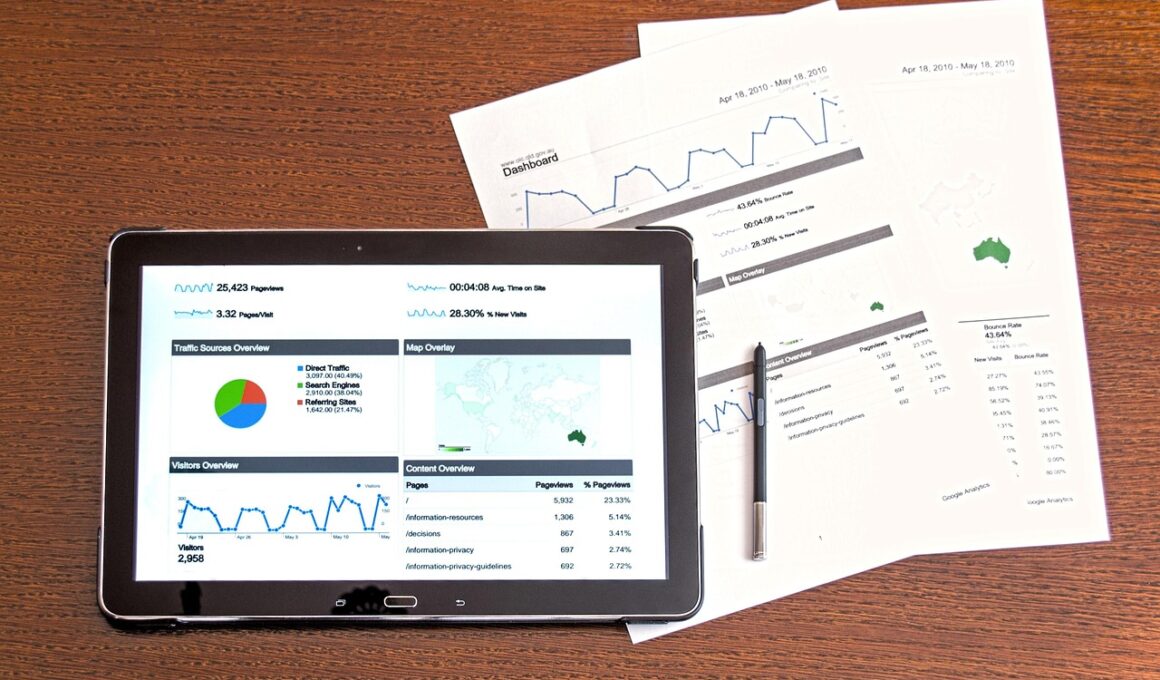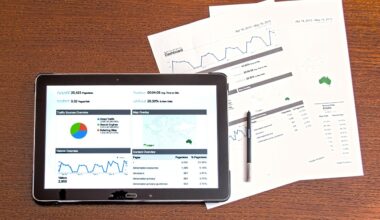The Role of Data Analytics in B2B Marketing Budgeting
In today’s B2B landscape, data analytics is a crucial component of effective marketing budgeting. With the rapid advancement of technology, businesses can leverage data to inform their budget allocation decisions, ensuring that every dollar spent is optimized for maximum return on investment (ROI). First, businesses can utilize various analytics tools that track customer behaviors and preferences. This data yields insights that allow marketers to identify which channels are most effective, aiding in strategic resource allocation. Additionally, historical data analytics can identify trends that help inform future budgeting decisions. By examining past campaign performance, businesses can determine what worked and what didn’t, thus enabling more precise budgeting for future campaigns. Moreover, incorporating predictive analytics can help businesses forecast future trends and shifts in the market, allowing them to adjust their budgets proactively. This analytical approach contributes significantly to strategic planning and execution. Furthermore, data-driven decision-making promotes accountability within marketing teams, ensuring that spending aligns with overall business goals. Thus, data analytics is not just a tool; it’s essential for forming a robust B2B marketing budget.
Finally, successful B2B marketing budgeting requires ongoing analysis of data performance. Continuous monitoring allows businesses to adapt to changing market dynamics effectively. For instance, if certain marketing strategies are not yielding the desired results, reallocating budget resources to higher-performing avenues can enhance overall efficiency. Additionally, A/B testing different marketing approaches can lead to valuable insights into consumer responses, enabling businesses to invest wisely. Furthermore, collaboration between sales and marketing teams can provide a holistic view of customer journeys. Understanding the sales process strengthens the strategy behind budget allocation. Specifically, aligning marketing goals with sales objectives ensures that both teams work towards common targets, optimizing spend across the board. Teams can use key performance indicators (KPIs) to define success metrics and adjust budgets accordingly. Improving transparency in how budgets are allocated and spent fosters trust and cooperation between teams. Moreover, employing a customer relationship management (CRM) system can streamline data collection and enhance decision-making efficiency. Overall, integrating such tools into budgeting processes can vastly improve marketing outcomes and enhance ROI.
The Impact of Advanced Analytics on Budget Planning
Advanced analytics plays a pivotal role in B2B marketing budgeting by enhancing accuracy in forecasting and resource allocation. By implementing tools such as machine learning algorithms, companies can analyze vast datasets in real-time to maximize their marketing ROI. These technologies help identify emerging trends and shifts in consumer behavior, thus enabling marketers to make informed predictions regarding future performances. Additionally, segmentation analytics enables marketers to identify distinct consumer groups, tailoring budgets for specific demographics effectively. This targeted approach not only enhances marketing efforts but also ensures the budget serves each segment’s specific needs. Furthermore, budget forecasting can be enhanced by utilizing scenario planning, allowing businesses to simulate different market conditions and assess potential budget impacts. A responsive budgeting strategy that integrates advanced analytics empowers marketers to respond to unforeseen challenges swiftly. Implementing dynamic budget models fosters greater adaptability, which is essential in today’s rapidly changing digital environment. This data-driven approach minimizes risks associated with estimation errors, leading to more confident decision-making and investment strategies that yield higher returns.
Investment in analytics tools and technologies also leads to improved decision-making capabilities within B2B marketing teams. High-quality data analytics provides marketers with actionable insights that can transform budgeting processes. By obtaining a clearer understanding of customer needs and preferences, marketing leaders can prioritize spending on high-return channels. Additionally, when conducted regularly, predictive analytics helps track campaign effectiveness over time, allowing teams to adjust their strategies as needed. By relying on accurate data, businesses can avoid the pitfalls of guesswork and assumptions that often lead to wasted resources. Furthermore, effective use of visualization tools can present data in a user-friendly manner, making it easier for teams to interpret findings and implement strategies accordingly. Engaging dashboards foster collaboration among departments and support budget discussions with clear evidence. Consequently, integrating analytics into budget planning encourages a culture of data-driven decision-making across the organization. Over time, this can become a competitive advantage, positioning businesses for sustained growth in an increasingly data-centric marketplace.
Enhancing Cross-Departmental Collaboration
Data analytics not only benefits individual departments but also serves as a mechanism for enhancing collaboration across organizations. Marketing teams that leverage insights from data analytics can effectively communicate budgetary needs to finance, sales, and product development departments. This cross-departmental cooperation is essential for achieving cohesion in the overall business strategy. For instance, when marketing budgets are informed by sales data, organizations can develop campaigns that resonate with target markets and improve lead conversion rates. Shared access to data can also provide valuable feedback loops between marketing and sales, ensuring that both departments are aligned in their objectives and strategies. Additionally, this collaborative spirit fosters a culture of shared accountability for performance metrics. A unified approach allows businesses to deploy resources more efficiently, maximizing the impact of their marketing dollars. Moreover, having a comprehensive view of data enables companies to identify where additional resources may be necessary or where cuts can be made without sacrificing outcomes. Overall, integrated data analytics can drive better coordination and collective strategy, resulting in more effective budgeting processes.
Investing in data analytics systems can yield substantial ROI for B2B organizations. However, the initial implementation costs can be daunting for some businesses. To overcome this challenge, it’s essential to consider the long-term benefits of accurate data-driven budgeting. Companies should view analytics not merely as a tool but as an essential aspect of their financial strategy. By continually refining their analytics technology and methodologies, organizations can ensure long-term fiscal benefits. Moreover, prioritizing training on these systems can empower employees at all levels to derive value from the analytical processes. Training provides teams with the tools necessary to leverage data insights effectively. Over time, building a data-centric culture within the workforce leads to enhanced decision-making capabilities and transformative budgeting methodologies. Additionally, companies could explore partnerships or consultancies specializing in analytics to bridge the knowledge gap. Through collaboration, organizations can implement best practices that improve both budgeting strategies and overall marketing outcomes. Finally, continuous evaluation of budget performance using data insights reinforces financial discipline within organizations, paving the way for success in the competitive B2B market.
Conclusion: Embracing a Data-Driven Future
In conclusion, the integration of data analytics into B2B marketing budgeting is no longer optional; it is a necessity. As competition intensifies and customer expectations evolve, businesses must adopt a data-driven approach to budgeting. Utilizing analytics enables organizations to allocate resources strategically while maximizing ROI and improving campaign effectiveness. Companies that harness the power of data can adapt to market changes swiftly and maintain a competitive edge. Furthermore, fostering cross-departmental collaboration through shared data insights enhances business strategies overall. The future is promising for organizations that embrace data analytics, as they will be better positioned to navigate marketing complexities and achieve sustainable growth. However, effective implementation requires commitment to ongoing training and technological investment. By prioritizing analytics, businesses can optimize their decision-making processes and ensure they remain resilient against market fluctuations. Embracing a culture of data-driven budgeting encourages accountability, creativity, and innovation within marketing teams. Ultimately, the road to successful B2B marketing budgeting is paved with the insights derived from data analytics, leading businesses towards a prosperous future.
As companies strive for success in the B2B space, the role of data analytics in budgeting continues to evolve. Being data-driven is now indispensable in establishing transparent and efficient budgeting processes, which are critical for sustaining competitive advantage in an increasingly digital marketplace. This transformation not only optimizes marketing strategies but also instills a proactive approach to budget management, ensuring that every investment is aligned with strategic objectives. Companies interested in refining their budgeting process should begin exploring various analytics tools that fit their needs and scale. Investing in both technology and talent will empower marketing teams to utilize data insights and develop accurate forecasts. Establishing a robust feedback loop will also be essential in harnessing insights to improve future budget allocations. Today’s marketers need to embrace a mindset of continuous improvement facilitated by data. Also, sharing insights across organizational silos can catalyze innovative budgeting solutions. Thus, businesses committed to data analytics are more likely to thrive in the competitive landscape. In light of these insights, the path towards effective B2B marketing budgeting lies in integrating data analytics to drive informed decision-making.


